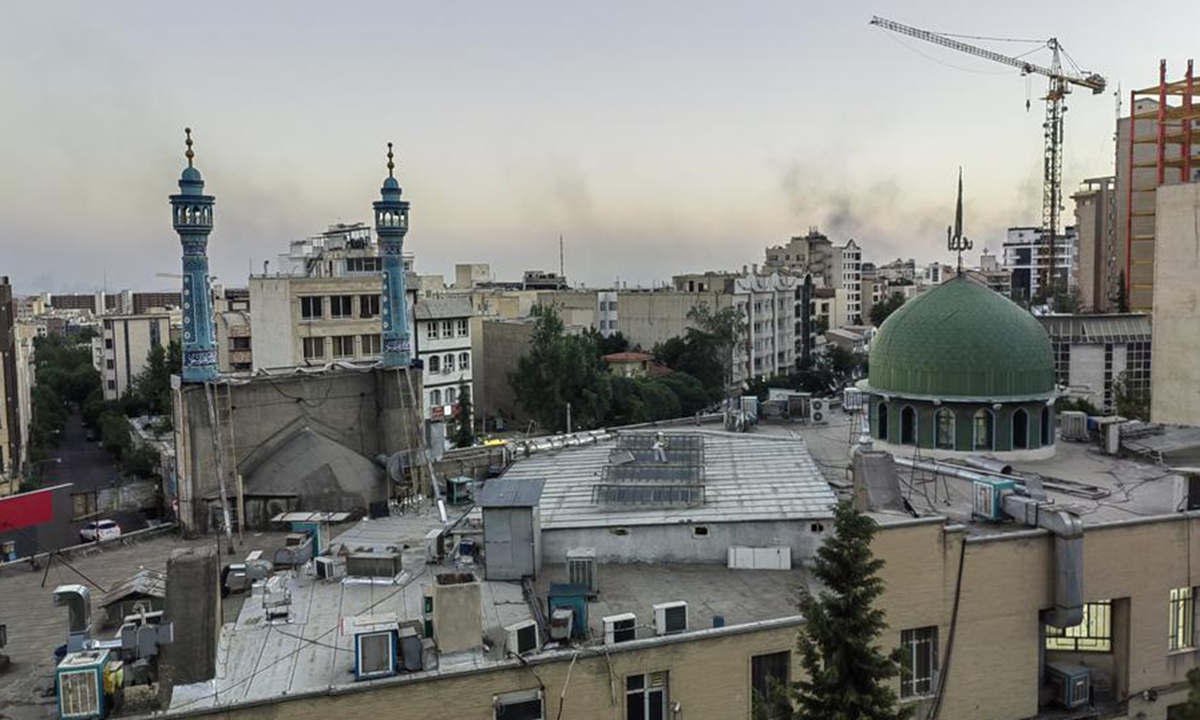
This photo taken with a mobile phone shows smoke in Tehran, capital of Iran, June 17, 2025. (Photo: Xinhua)
On Thursday afternoon, Chinese President Xi Jinping held phone talks with Russian President Vladimir Putin, during which the two leaders exchanged views regarding the situation in the Middle East.
President Xi put forward a four-point proposal that ceasefire must be an urgent priority, ensuring civilian safety must be a top priority, dialogue and negotiation are the fundamental solutions, and the international community's peacemaking efforts are indispensable. This conversation took place at a critical moment as the Israel-Iran conflict continues to escalate. The coordination of positions between the Chinese and Russian leaders not only reflects the depth of strategic cooperation between the two countries, but also sends a clear message to the international community: a call to de-escalate tensions and safeguard regional peace.
The current crisis in the Middle East has gone far beyond the scope of a conventional conflict. In a new round of airstrikes on Thursday, Israel targeted three of Iran's nuclear facilities, while a missile launched by Iran was reported to have hit a hospital in Israel. Both sides have vowed retaliation, and the situation is at serious risk of spiraling out of control.
Meanwhile, as a major power with special influence over Israel, the US has not played a constructive role. Instead, it has continued to fan the flames, even signaling a willingness to "get directly involved," which seriously undermines the international community's expectations for a soft landing to the crisis. With the conflict now reaching a point where "nothing can be ruled out," the window of opportunity is extremely narrow.
Once the situation spirals out of control, it will be far more difficult to reverse course. At this critical juncture, China has put forward a comprehensive and forward-looking proposal - one that addresses both immediate needs and long-term solutions. Among major powers, it is the first to do so, demonstrating a strong sense of responsibility.
The "four-point proposal" is highly targeted and addresses the core of the current issues. For example, it calls on the parties involved in the conflict, especially Israel, to halt military operations as soon as possible, to avoid harming innocent civilians, to firmly support a political solution to the Iranian nuclear issue, and urges the international community, especially major countries that have a special influence on parties to the conflict, to make efforts to cool down the situation. These are all key points where significant changes could occur under the current circumstances.
Problem-oriented in nature, the "four-point proposal" not only identifies the fundamental solutions to the crisis but also outlines effective paths to conflict mitigation. It focuses on lasting peace and collective security while upholding international order and fairness. It reflects China's accurate assessment of the situation and aligns with the widespread calls from the international community. This is a comprehensive crisis-resolution framework that is both feasible and actionable.
China has always been a builder of peace and a promoter of stability in the Middle East, as demonstrated through concrete actions. From promoting the reconciliation between Saudi Arabia and Iran to supporting Syria's return to the Arab League; from advocating the just cause of restoring the Palestinian people's legitimate national rights to pushing for peace in Gaza and unity within Palestine; from fulfilling regional peacekeeping duties to providing humanitarian aid, China consistently acts based on the rights and wrongs of each issue and the fundamental interests of the people in the Middle East. It actively promotes a new vision of security that is common, comprehensive, cooperative, and sustainable.
On the other hand, Saudi Arabia and Iran reached the Beijing Agreement and the Palestinian factions signed the Beijing Declaration - these reflect the region's trust in China's fair stance and its welcome of China's new security concept. President Xi's latest "four-point proposal" regarding the Israel-Iran conflict is consistent with China's moral position for peace in the Middle East.
With instability in the Middle East, achieving global peace is difficult. Efforts by all parties to promote a ceasefire and negotiations are not only necessary for the Middle East but also essential for global peace and stability. This requires coordination and consensus among major powers. The recent phone call between President Xi and President Putin exemplifies the close communication and coordination between China and Russia on major international hotspot issues. As major world powers and permanent members of the United Nations Security Council, China and Russia work closely together on the international stage, jointly playing a "stabilizing" role for global and regional peace. This not only highlights the positive role of emerging powers in global governance but also demonstrates the correct way for major powers to coexist.
The situation in the Middle East confirms that the world has entered a "new period of turmoil and transformation," and the "four-point proposal" reflects China's consistent security perspective. From the Russia-Ukraine conflict to the Israel-Palestine issue, it's evident that China's suggestions are forward-looking and are increasingly accepted by more countries. In the current context of clouds hanging over the Middle East, hopefully the international community will take action as soon as possible and align with China's "four-point proposal." China is willing to continue strengthening communication and coordination with all parties, building consensus, advocating for justice, and playing a constructive role in restoring peace in the Middle East.













